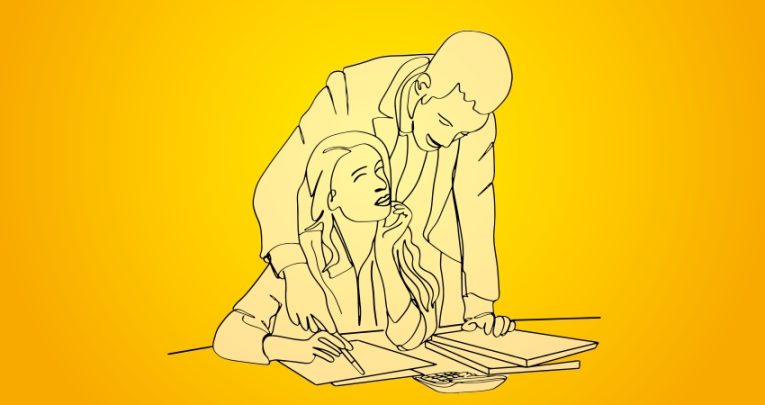Sexual harassment in schools – When teachers abuse pupils

Gordon Cairns examines an academic study that sheds worrying light on the extent of sexual harassment directed against pupils by teachers

- by Gordon Cairns
- English and forest school teacher

A recently published report has revealed a startling list of poor behaviour demonstrated by teachers towards their teenage students. This ranges from comments on some students’ physical appearance, to attempts to kiss them and even ask them out via dating apps.
Produced by a team of four researchers, ‘An Exploratory Study on Teacher Perpetrated Sexual Misconduct in Irish and UK Secondary Schools’ compiles the findings of a survey conducted among almost 600 adults about their experiences of sexual misconduct perpetrated by teaching staff while they attended secondary school in either the UK or Ireland in the recent past.
Virtually all respondents reported experiencing some form of sexist harassment (different treatment, offensive remarks). 85% reported experiencing sexual harassment in schools (ranging from offensive remarks relating to bodily appearances and sexual activity, through to unsolicited sexual messaging and unwanted advances).
One in five respondents reported that a teacher had attempted to establish an unwanted romantic or sexual relationship with them. 10% recalled a teacher sexually harassing them online.
Upsetting stories
A detail that one of the report’s authors, Dr Kate Dawson of the University of Greenwich, found especially distressing were the reflections by some respondents on the impact that sexual harassment in schools had had on their academic lives and subsequent career choices.
Nearly half of the study’s Irish respondents and a third of those from the UK said that unwanted attention from a teacher had affected their participation in school-wide and extracurricular events.
In Dr Dawson’s view, “The most upsetting stories were from people in their early 40s who were really good at a particular subject, or had really enjoyed it, but had to avoid it [because of the teacher], or were made out to be a ‘troublemaker’, after missing multiple classes for a reason they couldn’t come forward and explain. This would also be a potential reason why young people would drop out of school.”
Snapshot
The study is among the first of its kind. Therefore we could consider it a snapshot of the issue as it currently stands. However, Dr Dawson believes the problem is far bigger than we currently know and will demand more data, given how existing research into hierarchical institutions consistently shows abuses of power taking place in all walks of life. “I can’t imagine why it would be any different in a school context,” she notes.
Since the report’s publication in August 2023, a large number of teachers have contacted Dr Dawson, harbouring concerns over a colleague’s behaviour, but unsure of how to proceed.
She further adds that many have gone on to share the report via social media platforms. Other teachers have responded, describing similar recollections and experiences.
‘Weird conversations’
One possible reason for the under-reporting of teacher-perpetrated sexual harassment in schools could be victims’ lack of awareness that a teacher has committed abuse. As Dr Dawson explains, educating victims can play a huge role in accurate reporting of the problem and its scale.
“Teenagers often have a very black and white understanding of what ‘sexual misconduct’ or ‘abuse’ means. They will often think of rape or forced sex,” she says.
“If they’re being harassed by somebody, they might know it feels wrong, but lack the right words to describe it. Therefore, they may find it difficult to report or wrap their heads around it themselves. They might just think of the experience as a weird conversation, rather than as something illegal or inappropriate.”
Normalised
While peer-to-peer sexual harassment remains an unfortunately visible problem within schools, impacts for victims tend to to be far more severe when sexual harassment is meted out from someone in a position of relative power or trust.
Dr Dawson observes that since harassment from teachers typically occurs on school grounds or in classrooms, it will often be witnessed by peers nearby.
“If the teacher – a person in a position of authority who you’re meant to be looking up to – is acting in that way, it normalises such behaviour,” she says.
“How can we expect students to act in ways that align with our values when their teachers are behaving in a sexually inappropriate manner?”
Dr Dawson believes that we could address this problematic behaviour through better reporting procedures for victims, and by making it clear to educational professionals precisely what is and isn’t appropriate behaviour (something that doesn’t happen presently in England), beginning at the point of initial teacher training.
Trending
Culture of acceptance
As the report makes plain, sexual harassment can occur through flirting or inappropriate conversations. It doesn’t have to involve sexual touching for us to describe it as such.
So what would an effective response look like? “There are lots of different strategies that we need to take at various levels,” concedes Dr Dawson. “But ultimately, it has to be about changing the culture of acceptance around behaviours that could contribute to harassment.
“The first step would be to train teachers on specifically what constitutes appropriate or inappropriate topics of conversation, and on ways of engaging with students.”
Dr Dawson has reviewed the literature currently emerging from teacher training institutions that pertain to appropriate conduct with students. She has found them to be quite vague. Statements declare that teachers need to ‘maintain professional relations with all staff and students’, without explaining what a ‘professional relationship’ might actually look like in practice.
Instead, where possible, she would like to see teacher training colleges providing detailed examples of what is and isn’t okay to say to a student.
Teacher training
“In society at large, where we’ve made moves to teach people about what is appropriate behaviour, even on the tube, it’s bizarre that we don’t include this in teacher training.
“This is particularly so when teachers have access to a huge number of students and vulnerable people, and are in a position of power over them.”
“We would think people would use their common sense, but common sense in relation to sexual harassment isn’t that common, because it’s not something we talk about in public. We don’t know what is and isn’t inappropriate.
“And I don’t know why we would assume teachers have this knowledge, when we recognise that the rest of the country doesn’t.”
Reporting mechanisms
Dr Dawson would also like to see the creation of mechanisms for recording harassment of students by staff that don’t involve directly approaching a figure of authority within the school context. This is because doing so can be quite daunting.
“There needs to be an alternative avenue students can use to report incidents. These need to be followed up by a proper investigation, as we don’t want people making unsubstantiated claims.”
She adds, “It’s not fair for teachers to be called out on something that didn’t happen. But if we can compare an incident in one school to, say, different, yet similar incidents flagged by students at other schools where a teacher previously worked, we can then see how that would be indicative of certain patterns of behaviour.”
Taskforce
So where do we go from here? “The next step will be to develop a taskforce to see how we can develop a training resource. We need to pilot it with teachers, and then roll it out to general teacher training for anyone who will be working in a secondary school or college,” suggests Dr Dawson.
“We’ll be conducting a large, nationally representative study to see how prevalent these experiences are. We’ll also be looking to speak with teachers in an anonymous study to examine the issue of school culture, and the acceptance or tolerance of harassment among teaching staff.
“We’ll be sharing details of these further studies over the coming months. Readers can follow me on Instagram or X to keep up to date with the studies’ findings, participate in future studies or potentially collaborate on the development of harassment prevention resources.”
Gordon Cairns is an English and forest school teacher who works in a unit for secondary pupils with ASD; he also writes about education, society, cycling and football for a number of publications. Dr Kate Dawson is a lecturer in psychology in the School of Human Sciences, University of Greenwich.










